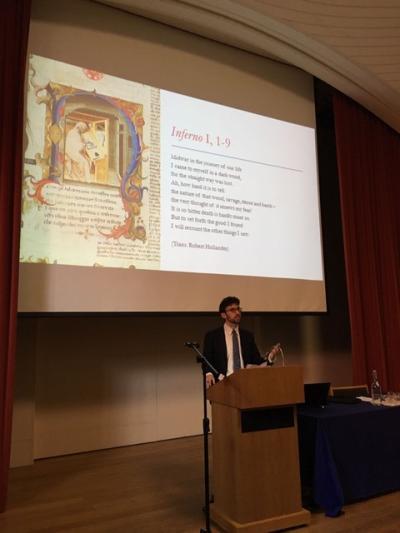Modern languages doctoral student Nicolò Crisafi was awarded the 2017 Senior Paget Toynbee Prize for his essay 'Riscattare la totalità dell'esperienza amorosa' nella settima cornice del Purgatorio’, focusing an episode in Dante’s Purgatorio.
The prize is awarded annually to the best 2 essays written by Oxford University graduate students on the works of the poet Dante Alighieri (1265-1321), Old French Language and Literature or Old Provençal Language and Literature. It is named after the Dante scholar Paget Toynbee, and worth £1,000.
For his winning essay, Nicolò focused on an episode of Purgatorio written by Dante “The essay looks at the terrace of purgatory where the pilgrim meets the souls of the lustful, whose destiny it is to leave earthly habits and attachments behind on their journey to heaven. I argue that the figurative language of the canto often resists this moral reading. Time and time again, the text emphasises not the spiritual connotations of words and metaphors, but the concrete meaning they have on earth. In the language of these canti, love, the body, and one’s past are not left behind and erased, but vindicated.”

Nicolò is no stranger to the ‘bella lingua’ and the works of Dante, as he is on the last year of his DPhil studying the poet, especially his Commedia. “My thesis takes as its starting point what I call ‘Dante’s masterplot’. The masterplot is the grand narrative through which Dante, at various stages of his life and literary career, rewrites his past experiences from a new perspective. I am interested in the ways in which the poem departs from this retrospective narrative, and opens up to alternative modes of storytelling, through paradoxes, detours and an anxiety about the future.”
After his DPhil at LMH, Nicolò hopes to continue to teach and research literature, a topic that the public should not underestimate: “The way one uses words and tells stories has the power of shaping the way a person thinks of the world, of truth, of others. As a reader and scholar, I try to appreciate and interrogate how texts exercise this power. The questions I ask in my research deal with the same issues that are at the forefront of the debates we are having today on truth and fiction, conflicting narratives, authority and authoritarianism, so-called alternative facts, and their relation to emotion. Being a more critical reader can be a key quality in navigating the contemporary world.”
Nicolò’s essay can be read here (in Italian). Photo on the right shows Nicolò presenting his thesis work at the annual LMH Research Fair, which took place last May.